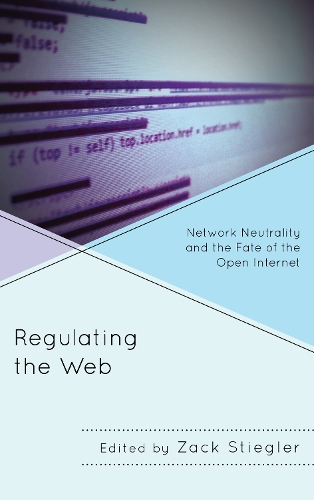
Regulating the Web: Network Neutrality and the Fate of the Open Internet
(Paperback)
Publishing Details
Regulating the Web: Network Neutrality and the Fate of the Open Internet
By (Author) Zack Stiegler
Contributions by John Nathan Anderson
Contributions by Jeremy Carp
Contributions by Benjamin Cline
Contributions by Michael Daubs
Contributions by Brian Dolber
Contributions by Daniel Faltesek
Contributions by Michael Felczak
Contributions by Mark Grabowski
Contributions by Pallavi Guniganti
Bloomsbury Publishing PLC
Lexington Books
10th June 2014
United States
Classifications
Tertiary Education
Non Fiction
Communication studies
Internet: general works
302.231
Physical Properties
Paperback
266
Width 154mm, Height 229mm, Spine 20mm
390g
Description
Since its popularization in the mid 1990s, the Internet has impacted nearly every aspect of our cultural and personal lives. Over the course of two decades, the Internet remained an unregulated medium whose characteristic openness allowed numerous applications, services, and websites to flourish. By 2005, Internet Service Providers began to explore alternative methods of network management that would permit them to discriminate the quality and speed of access to online content as they saw fit. In response, the Federal Communications Commission sought to enshrine net neutrality in regulatory policy as a means of preserving the Internets open, nondiscriminatory characteristics. Although the FCC established a net neutrality policy in 2010, debate continues as to who ultimately should have authority to shape and maintain the Internets structure. Regulating the Web brings together a diverse collection of scholars who examine the net neutrality policy and surrounding debates from a variety of perspectives. In doing so, the book contributes to the ongoing discourse about net neutrality in the hopes that we may continue to work toward preserving a truly open Internet structure in the United States.
Reviews
Regulating the Web is a series of 11 essays that grew out of panel discussions from the 2011 National Communication Association meeting. As such, it shares the strengths found in many books growing out of conferences. It is well researched and full of very current information as of the time of its publication. Contributors present novel and informative perspectives on the history, politics, and current state of the Internet. This is a worthwhile read for audiences interested in the topic of net neutrality. Summing Up: Recommended. Graduate students, researchers/faculty, and professionals. * CHOICE *
Network neutrality is one of the most important policy issues of the 21st century, with implications for the future of politics, intellectual life, culture, the economy, and more. This smart, sophisticated, and cutting-edge collection offers both a solid introduction and a comprehensive overview of the best thinking of proponents of an open internet. -- Thomas Streeter, University of Vermont
Author Bio
Zack Stiegler is assistant professor of communications media at Indiana University of Pennsylvania.
